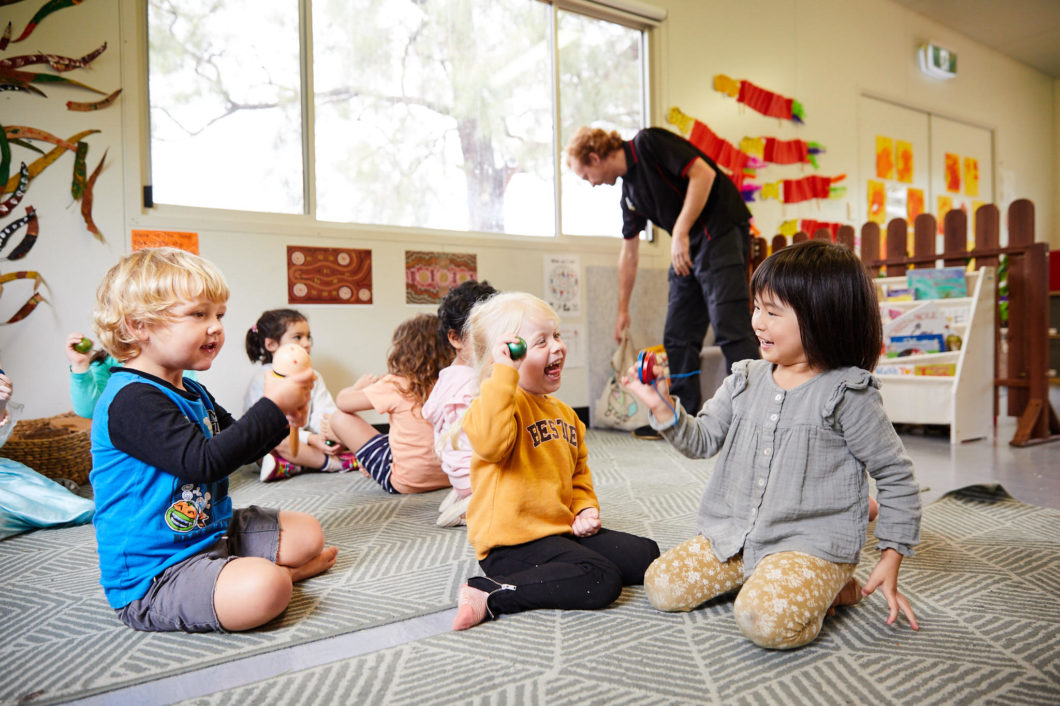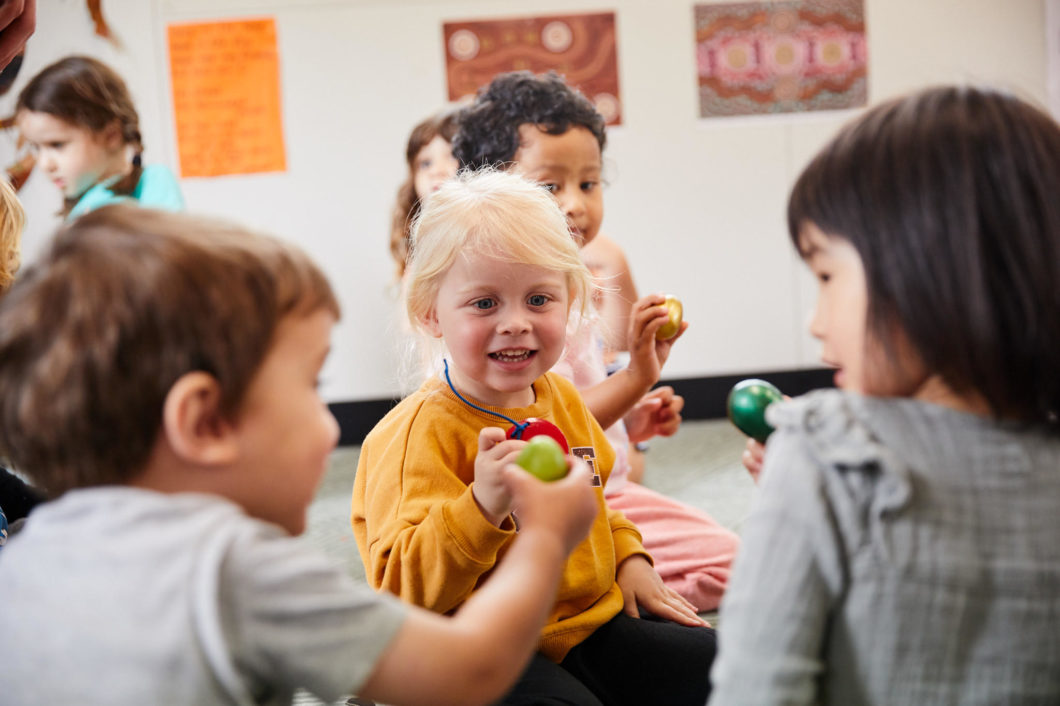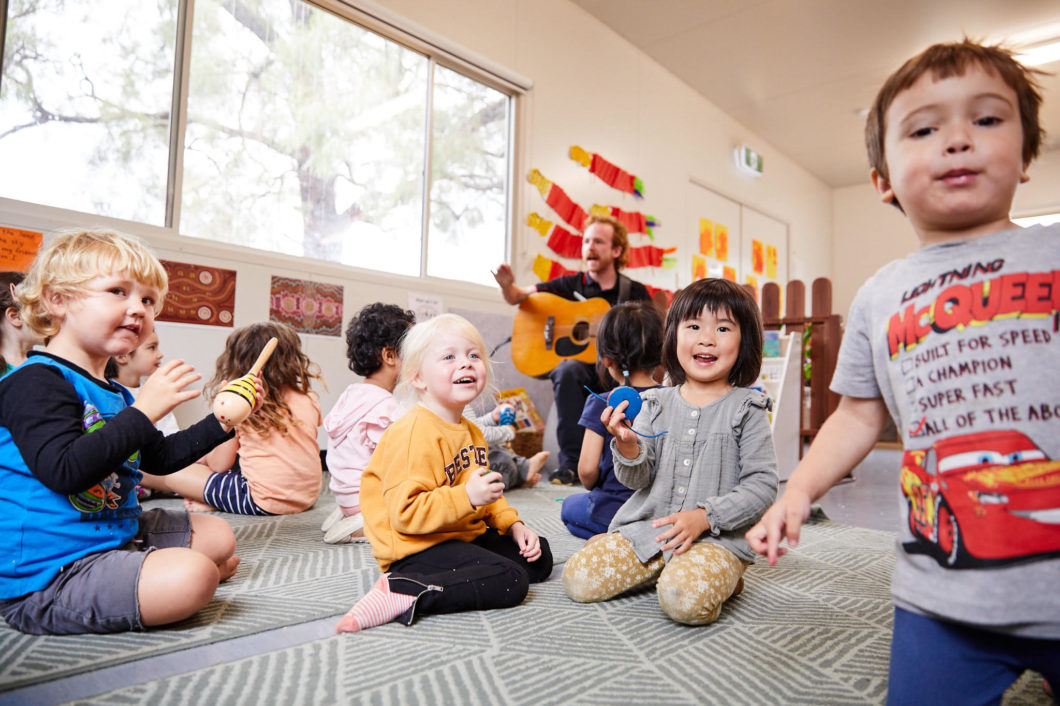It is no secret that children love music. From birth, parents instinctively use music to engage with their children, whether it be through nursery rhymes or lullabies, to soothe or animate.
Music and song are integral aspects of our culture; they are instrumental in movies, theatre, religious worship, concerts, celebrations, holidays and even official ceremonies. We use music as a means to connect and express love, appreciation and joy, and it is this innate connection people have with music that makes it so beneficial for children. Continue reading this blog to learn about the host of benefits of music for children, including brain, literacy, numeracy, physical, social and emotional development.
Benefits of Music for Children’s Brains
In a five year long study, neuroscientists from the Brain and Creativity Institute at the University of Southern California found that exposure to music during childhood can boost brain development in children, most prominently in the areas of the brain responsible for language development, processing sound, reading skills and speech perception.
This is because musical experiences, like listening to music, singing or playing an instrument stimulate key areas of our brains, which results in the formation of new neural connections and the strengthening of already established pathways.
Exposure to music is also very beneficial for children’s cognitive development, as it aids in building concentration, memory and attention.
Benefits of Music for Children’s Literacy Development
Though it may not always feel like it, children are excellent listeners. From when they are very young, infants are able to recognise different speech sounds, like the voice of a parent and changes in the melody of familiar tunes. Exposing your child to music capitalises on this innate ability, as listening to the words and melody of songs and nursery rhymes helps them to learn to decode the sounds and meanings of words through experience with a greater variety of vocabulary. This translates to improved speech and language development through children having a larger vocabulary and more accurate pronunciation.
Music is particularly influential in the development of the left side of the brain, which is associated with language and reasoning. For this reason, it improves sound recognition and teaches rhythm and rhyme, the understanding of which helps children learn to read more easily.

Benefits of Music for Children’s Numeracy Skills
A less well-known benefit of music for children is that it supports the development of numeracy skills. A significant and instinctual component of music is listening to the beat. Through listening to and counting along with the beat, children are exposed to the concepts of fractions and patterns.
Breaking down musical sentences into beats is important for the conceptual understanding of fractions, and clapping to the beat, particularly in patterns (think tap, clap, tap, clap, or ta, ta, ti-ti, ta) builds pattern-recognition skills which are important for mathematical reasoning.
Benefits of Music for Children’s Physical Development
Music is also incredibly beneficial for children’s physical development. Listening to and participating in music helps the brain and body to work together, strengthening the connection between the two. Children develop their coordination through dancing to music. Songs that have specific actions attached are particularly relevant here; head, shoulders, knees and toes and the hokey pokey are great for gross motor skill development and the itsy bitsy spider is perfect for fine motor improvement.
Benefits of Music for Children’s Social and Emotional development
Music is an inherently joyful activity, and it is excellent for resetting the mind as it gives children (and adults!) a means to be creative, express themselves, relax and unwind, get excited and energised, let go of negative emotions and let positive ones in, and relieve stress and tension.
Engaging in musical activities with others, like in a music group, dance class or choir improves children’s social skills as well, as it helps them learn to work together with a clear shared goal, like singing the words to a song or doing movements in time with the music. Listening to music is also beneficial for empathy and emotional recognition, as research has found that children who play music together are more proficient at recognising other people’s emotions.

Exposure to music and song is the key to accessing all of the incredible benefits of music for children! Like we do here at Choklits, try purposefully incorporating music into your child’s day, whether that be through a soft classical piece playing in the background during reading time, a fun nursery rhyme playlist during a car ride, an impromptu dance party in the garden or singing lullabies together at bedtime. You can only bring greater joy to you and your child’s lives with more music, so go and sing a song knowing that you’ll be having fun and supporting their development too!



